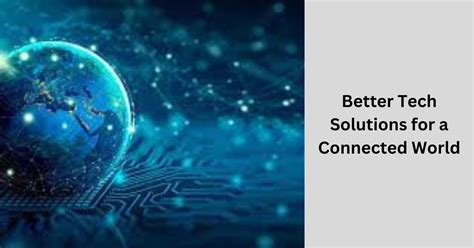The world is rapidly becoming a complex network of interconnected devices, systems, and technologies. As we continue to advance in the digital age, it's becoming increasingly important to develop universal tech solutions that can seamlessly integrate with various platforms, devices, and ecosystems. This not only enhances user experience but also fosters innovation, efficiency, and growth.
In today's connected world, individuals and organizations alike are faced with numerous challenges that arise from the fragmentation of technologies. For instance, compatibility issues between different devices and systems can lead to frustration, wasted time, and lost productivity. Moreover, the lack of standardized solutions can hinder the adoption of emerging technologies, such as artificial intelligence, blockchain, and the Internet of Things (IoT).
To address these challenges, there is a growing need for universal tech solutions that can bridge the gaps between disparate technologies and create a more cohesive, interconnected world. These solutions should be designed to be scalable, adaptable, and secure, enabling seamless interactions between devices, systems, and users.
What are Universal Tech Solutions?
Universal tech solutions refer to technologies that can be applied across various platforms, devices, and ecosystems, without the need for significant modifications or customizations. These solutions are designed to be platform-agnostic, device-agnostic, and ecosystem-agnostic, allowing them to integrate with multiple systems and devices.
Examples of universal tech solutions include:
- Interoperable communication protocols that enable seamless data exchange between different devices and systems
- Cross-platform software development frameworks that allow developers to create applications that can run on multiple operating systems
- Standardized data formats that facilitate the sharing and exchange of data between different systems and devices

Benefits of Universal Tech Solutions
The benefits of universal tech solutions are numerous and far-reaching. Some of the most significant advantages include:
- Increased Efficiency: Universal tech solutions can automate many processes, reducing the need for manual intervention and increasing productivity.
- Improved User Experience: By providing a seamless and consistent user experience across different devices and systems, universal tech solutions can enhance user satisfaction and loyalty.
- Enhanced Innovation: Universal tech solutions can facilitate the development of new technologies and applications, leading to increased innovation and competitiveness.
- Reduced Costs: By reducing the need for customizations and modifications, universal tech solutions can help organizations save time and resources.
Examples of Universal Tech Solutions
There are many examples of universal tech solutions that are already making a significant impact in various industries. Some of these include:
- Cloud Computing: Cloud computing platforms, such as Amazon Web Services (AWS) and Microsoft Azure, provide scalable and on-demand access to computing resources, allowing users to deploy applications and services across multiple devices and systems.
- APIs: Application programming interfaces (APIs) enable different systems and devices to communicate with each other, facilitating the sharing and exchange of data and services.
- Blockchain: Blockchain technology provides a secure and decentralized platform for data storage and exchange, enabling universal access to data and services.

Challenges and Limitations
While universal tech solutions offer many benefits, there are also several challenges and limitations that need to be addressed. Some of these include:
- Interoperability: Ensuring that different systems and devices can communicate with each other seamlessly is a significant challenge.
- Security: Universal tech solutions require robust security measures to protect data and services from unauthorized access and cyber threats.
- Scalability: Universal tech solutions need to be scalable to accommodate increasing demands and usage.
Future of Universal Tech Solutions
The future of universal tech solutions is promising, with many emerging technologies and trends that are likely to shape the landscape. Some of these include:
- Artificial Intelligence: AI is expected to play a significant role in the development of universal tech solutions, enabling more intelligent and adaptive systems.
- Internet of Things (IoT): IoT is likely to drive the adoption of universal tech solutions, as more devices and systems become connected and interconnected.
- Quantum Computing: Quantum computing is expected to enable more secure and efficient data processing, leading to the development of more advanced universal tech solutions.

Conclusion
In conclusion, universal tech solutions are essential for creating a more connected and cohesive world. By providing scalable, adaptable, and secure solutions that can integrate with multiple systems and devices, universal tech solutions can enhance user experience, increase efficiency, and drive innovation. While there are challenges and limitations that need to be addressed, the future of universal tech solutions is promising, with many emerging technologies and trends that are likely to shape the landscape.






What are universal tech solutions?
+Universal tech solutions refer to technologies that can be applied across various platforms, devices, and ecosystems, without the need for significant modifications or customizations.
What are the benefits of universal tech solutions?
+The benefits of universal tech solutions include increased efficiency, improved user experience, enhanced innovation, and reduced costs.
What are some examples of universal tech solutions?
+Examples of universal tech solutions include cloud computing, APIs, and blockchain technology.
